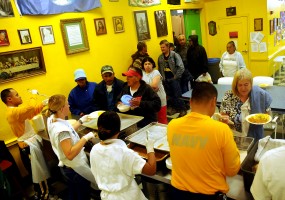 A couple of weeks ago my blogging buddy Trevor O’Donnell posted one of his parting essays, “Community Engagement is a Lousy Way to Sell Tickets.” [Disclosure: we had been corresponding on the subject in the days ahead of that post.] In it he highlights the fact that community engagement does not generate much in the way of immediate ticket sales and to expect it to do so demonstrates a lack of understanding of the nature of the work. He also expresses concern that combining marketing and community engagement in a single position as some organizations are beginning to do dilutes both and makes effectiveness nearly impossible. (To be fair, I think he would say “impossible.”) As is often the case, he and I are in wide agreement on much he wrote. In particular, when he said “community engagement will one day eclipse marketing as the ultimate way to make arts organizations optimally responsible to, and thus more relevant, useful and valuable to, their communities” I almost thought I was ready to go check into my retirement villa in Belize. (Well, OK, no such thing actually exists, but I can dream.)
A couple of weeks ago my blogging buddy Trevor O’Donnell posted one of his parting essays, “Community Engagement is a Lousy Way to Sell Tickets.” [Disclosure: we had been corresponding on the subject in the days ahead of that post.] In it he highlights the fact that community engagement does not generate much in the way of immediate ticket sales and to expect it to do so demonstrates a lack of understanding of the nature of the work. He also expresses concern that combining marketing and community engagement in a single position as some organizations are beginning to do dilutes both and makes effectiveness nearly impossible. (To be fair, I think he would say “impossible.”) As is often the case, he and I are in wide agreement on much he wrote. In particular, when he said “community engagement will one day eclipse marketing as the ultimate way to make arts organizations optimally responsible to, and thus more relevant, useful and valuable to, their communities” I almost thought I was ready to go check into my retirement villa in Belize. (Well, OK, no such thing actually exists, but I can dream.)
Yet, there were a couple of nits to pick. He held that community engagement was inherently expensive and that it implied charity work such as “homeless shelter painting classes, free concerts in the parks or elementary arts education.” With respect to the former, as I commented on his blog,
Some choices might be expensive, but engagement is fundamentally 1) rooted in a community-aware mindset out of which programming arises (programming for which budgets already exist) and 2) expressed in relationship building. Changing habits of thought may be incredibly difficult but it is not necessarily expensive. Nurturing relationships cannot be, like fundraising should not be, placed solely in the lap of staff. There are interesting things that can be done with board and other volunteers working with communities to build trust, awareness, and understanding.
Few things in life have no cost, but a good part of my current work is helping organizations see how things they already do (and for which budgets exist) can be re-purposed with a greater emphasis on communities and relationship building without radically overthrowing the enterprise.
An equally important nit lies in the assumption that community engagement equates with charity work. Again, as I said in response to his post:
That might be true if the only communities we needed to address were the homeless or those subsisting on incomes below the poverty line, but there are plenty of other non-participating communities with which we need to build relationships.
Some charity work undertaken by arts organizations might represent true community engagement, but I’m hard-pressed to believe that many arts organizations would choose the homeless or the desperately poor as the first communities with which they need to build relationships. The universe of those unassociated with or disaffected from arts organizations is depressingly vast.
If as is too often the case, such work is for the purpose of image-buffing, its intent is not to build relationships with those being served; its goal is to be seen as worthy by the community at large. There are far more efficient ways to build relationships (directly) with new communities. Charity work can be valuable in demonstrating bona fides as a responsible community citizen but it’s not inherently community engagement. (I even agree with him, as addressed in our comments on his post, that affluent young lawyers who are not already arts supporters are a community worthy of pursuit. It’s just that that group, by and large, will not expand the demographic pool–an essential outcome for long-term viability.)
Don’t get me wrong, charitable endeavors are necessary in a healthy society, but I am in no way suggesting that arts organizations become community charities. If some choose to go that route, that’s fine. My advocacy, in contrast, is for community-aware activities, growing out of relationships of trust and understanding, that benefit both the community and the arts organization. Sustainable results cannot be achieved if there is no self-interest served for the organization and for the arts.
Engage!
Doug
Photo from Wikipedia: http://en.wikipedia.org/wiki/Soup_kitchen
